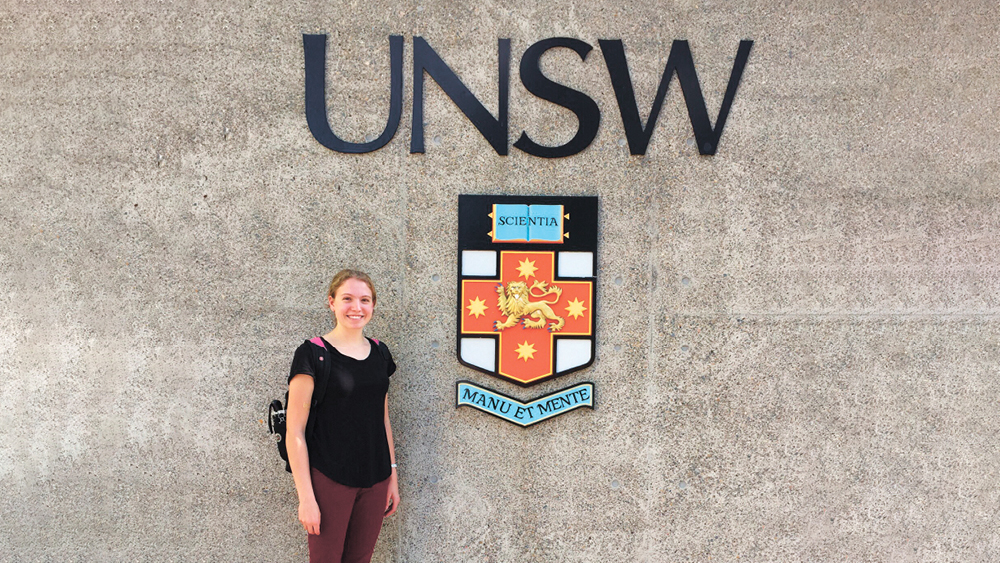Is there room for Christ on campus?
University is an ethical minefield shares student
Studying medicine as a Christian means navigating a minefield of ethical issues, as 22-year-old Alex McHarg has discovered.
Now in her fourth year of a six-year medical degree at the University of New South Wales (UNSW) in Sydney, Alex has already tackled weighty debates around euthanasia, abortion and gender identity.
“We had specific tutorials on some of these ethical topics in first and second year. I remember a tutorial we had on abortion and we did the pros and cons, and looked at it from different ethical frameworks and principles,” she explains.
“I feel like people are happy for you to have your own opinion if it doesn’t affiliate with an institution or a faith background.” – Alex McHarg
At the time, Alex didn’t feel comfortable enough around her relatively new classmates to bring the Bible into the discussion.
“I often did air my opinion but I don’t think I actually used my faith or the Bible as my reasoning … I feel like people are happy for you to have your own opinion if it doesn’t affiliate with an institution or a faith background. But as soon as you say, ‘Oh well, the Bible says this …’ I feel, potentially, that people would form opinions of me that are incorrect, make assumptions or write me off as … not being progressive.”
As she’s come to know more students in her course, Alex has grown in confidence to make her faith known.
“It makes it easier because people already have an opinion of me, so if I come out in an ethics tutorial or in a class and say I actually believe this because of my faith, then people are less likely to form a wrong judgment,” she says.
Alex is also lucky enough to know a lot of other Christians in her degree. “So I feel quite well supported in that respect,” she says.
She sometimes attends events and Bible studies run by Christians in Medicine at UNSW, a group for medical students organised by Campus Bible Study.
This year Alex went along to the Christians in Medicine mid-year conference, an annual three-day event. However, she adds that she’s chosen to divest most of her ministry energy into her local church on the north shore of Sydney, where she serves as a youth group leader.
“I didn’t want my opinion to be out there and get back to people in the wrong way, so misconstruing it or sharing it in a way that would be hurtful to others.” – Alex McHarg
Despite the strong Christian presence on campus, there are still moments when Alex finds it challenging to be a Christian at uni. One of these times was around the plebiscite on same-sex marriage in late 2017.
“That was massive at uni,” Alex shares. “There were lots of people advocating for it; there were people on the walkway [on campus] trying to stop you to talk about it. It definitely felt like if I expressed my opinion, people would label me as someone who hates other people or who has homophobic views.”
Alex says she chose not to share her views based on an underlying sense of fear about being “hated” as a Christian, but also out of a desire to “keep the peace with other people”.
“I didn’t want to hurt other people. I didn’t want my opinion to be out there and get back to people in the wrong way, so misconstruing it or sharing it in a way that would be hurtful to others.”
As she considers her future, perhaps as a rural GP, Alex knows she will confront more sticky issues around her faith in the medical profession.
“Talking about spiritual health hasn’t really been explained to us much in our degree, whether that would be acceptable or not,” she notes.
Fortunately for Alex, she has Christian parents who are also doctors.
“Mum is already a role model for how to deal with issues in medicine where my faith is contrary to what people want me to do. I have asked her a few times, ‘What do you do if someone comes up to you and wants to talk about abortion, or how do you talk to anyone about faith, about spirituality?’ She’s been a good resource.”
Alex adds: “I definitely feel like I’m not alone. It’s helpful to have older, working doctors who hold similar opinions.”
Email This Story
Why not send this to a friend?


